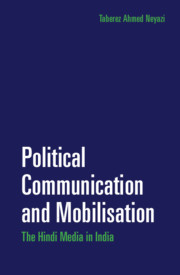Book contents
- Frontmatter
- Dedication
- Contents
- List of Figures, Tables and Maps
- Preface
- Acknowledgements
- Chapter 1 Introduction: Political Communication and Mobilisation in India
- Chapter 2 Under Colonial Rule: Mobilisation in the Hindi and English Press
- Chapter 3 Media and Mobilisation in Independent India
- Chapter 4 Localisation, Grassroots Mobilisation and Hindi News Media
- Chapter 5 Political Economy of the Hindi Press
- Chapter 6 The Hybrid Media System, Anti-corruption Movement and Political Mobilisation
- Chapter 7 Agenda-setting and Mobilisation in a Hybrid Media Environment
- Chapter 8 Conclusion: Politics, Power and Mobilisation in Digital India
- Bibliography
- Index
Chapter 5 - Political Economy of the Hindi Press
Published online by Cambridge University Press: 17 August 2019
- Frontmatter
- Dedication
- Contents
- List of Figures, Tables and Maps
- Preface
- Acknowledgements
- Chapter 1 Introduction: Political Communication and Mobilisation in India
- Chapter 2 Under Colonial Rule: Mobilisation in the Hindi and English Press
- Chapter 3 Media and Mobilisation in Independent India
- Chapter 4 Localisation, Grassroots Mobilisation and Hindi News Media
- Chapter 5 Political Economy of the Hindi Press
- Chapter 6 The Hybrid Media System, Anti-corruption Movement and Political Mobilisation
- Chapter 7 Agenda-setting and Mobilisation in a Hybrid Media Environment
- Chapter 8 Conclusion: Politics, Power and Mobilisation in Digital India
- Bibliography
- Index
Summary
There have been growing debates about the increasing influence of markets and governments on the role of the fourth estate. A number of studies have analysed the ramifications of the corporatisation of the media and ownership concentration in the context of mature western democracies (Bagdikian, 1983, 2004; Bennett, 2004; Doyle, 2002; McChesney, 2007, 2008; McChesney and Schiller, 2003; Thussu, 2006b; Winseck, 2008). These and other studies have highlighted corporate influence and the ways political elites have inhibited news diversity and undermined the potential of the media to offer diverse perspectives on issues (Bennett, 2007; Entman, 2010; Hamilton, 2004; Waisbord, 2010). Younger and economically developing democracies have been witnessing a different, yet serious, challenge to the way the media system is evolving. Studies have shown increasing commercialisation along with globalisation (Thussu, 2007), opaque media ownership (Chakraborty and Rao, 2014; McCargo, 2011) as well as a cosy relationship between the government, the media and the top corporations (Bromley and Romano, 2005; Jakubowitz, 2007). Despite the diversity in the focus and contexts of these studies, they all question whether privately-owned corporate-run media is compatible with democratic values. India's public service broadcaster Doordarshan lost its monopoly decades ago, when most media scholars in India were critical of that monopoly's voice. Now with a cacophony of media outlets, almost all privately owned, most media scholars remain critical (Thakurta and Chaturvedi, 2012; Thakurta, 2014a; Thomas, 2014). While offering a critical perspective may be the role of the scholar in India, more research is needed to understand the contribution of media to democracy at this time of rapid digitalisation. While acknowledging the important contribution of these studies to understanding the political economy of the media, I also show the ways in which privately-owned corporate media has facilitated the rise of political activism in India and brought previously marginalised groups into the public sphere. I demonstrate that the relationship between privately-owned news media and editorial independence is not a zerosum game, where one of more necessarily means less of other and instead argue that both can coexist in a complementary and competitive way.
- Type
- Chapter
- Information
- Political Communication and MobilisationThe Hindi Media in India, pp. 103 - 136Publisher: Cambridge University PressPrint publication year: 2017



